Under the flagship programs of the Government, “Advanced Chemistry Cell (ACC) Batteries” and “National Hydrogen Mission”, to cut down on the Green House Gas (GHG) emission under Paris Climate Agreement 2015 and “Mission Net Zero Carbon Emission Railway” by 2030,
Indian Railways are set to run trains on hydrogen fuel-based technology. “We will remove the diesel generator and install a
hydrogen fuel cell. Input will change to hydrogen fuel from diesel and it will be the cleanest form of fuel. If hydrogen is generated from solar, it will be called green power,” said SK Saxena, CEO of Railway Energy Management Company Limited.
To reduce the dependence on fossil fuel based energy sources like diesel and electricity, Indian Railways is trying to build a hydrogen powered rail engine that can propel a passenger train on the suburban routes. These efforts are being taken to find alternative sources of fuel to power the trains. Last year at 107th Indian Science Congress in Bengaluru, former space scientist D Narayana Rao stated that a group from SRM University is working with Railways to develop the hydrogen powered rail engine.
Promises Zero Emission at Lesser Cost
Hydrogen fuel based trains are poised to disrupt the rail industry as a cost-effective, high performing, zero emission alternative to fossil fuels. These trains are equipped with fuel cells that produce electricity through hydrogen and leaves steam and water as the only emissions. Hydrogen fuel cell technology is an alternative approach to electrifying trains using existing rail infrastructure.
Indeed, to help in reducing pollution and promote cleaner fuels, the Government of India has recently introduced some plans to phase out the use of diesel trains by 2030. The experts of Railway are happy from this decision to phase out these units and use alternative power will revolutionize the Indian Railway.
Hydrogen is a common and easy to find element and can be separated from water via several means, including steam reforming which normally involves the use of fossil fuels and electrolysis which requires large amounts of electricity and is less commonly used.
Hydrogen can be served as a form of fuel once it is isolated. Scientists proposed that hydrogen fuel for railways can be produced in individual maintenance depots. In the last few years, the development of lighter and more capable fuel cells has increased the viability of hydrogen powered trains.
Challenges in the Way
There is no doubt in the fact that hydrogen fuel cells are gaining recognition as an eco-friendly way of generating power as it avoids the use of fossil fuels, produces zero carbon dioxide emissions and offers some distinct benefits over rechargeable batteries too. In the Railway sector, hydrogen powered trains could lead the way in green transport. However, for these futuristic trains to run on Indian rail networks, further innovation and investment is needed, along with a strong commitment from Government of India.
Ample Amount of Hydrogen Required
There are numerous challenges associated with Indian market of hydrogen. These are about the production of hydrogen and the refuelling infrastructure which are needed to support the hydrogen trains on the rail network. The energy and railway experts should work together for the abundance requirement of hydrogen and should have committed substantial investment to tackle these issues.
Although, research organizations and innovators are working towards the development of more efficient production methods and some positive growth can be expected. As well as, there are now quite a few production plants which run completely on solar or wind power which means that the hydrogen being produced here is a zero carbon fuel.
Experts say that hydrogen fuel cells use hydrogen to produce electricity and it must be drawn on board. This is produced using a process known as electrolysis, which itself is inefficient and energy intensive. Traditionally in India, electrolysis plants were powered by electricity generated through fossil fuel combustion. However, in the last few years, there is a global drive to improve the efficiency of the electrolysis process and produce hydrogen more sustainably.
Task to be Accomplished
Another important question which still remains unanswered is about the viability of hydrogen powered trains in long routes, like from Kashmir to Kanyakumari. Indian Railway transport is the lifeblood of the economy and as yet, it is not fully clear whether hydrogen trains will be able to provide the pulling power for moving the passengers up to such long distances along the length and breadth of the country. So, having already demonstrated its suitability for smaller distances, innovators are now rightly shifting their focus on developing hydrogen fuel technology for longer distances.
The Future Ahead
Hydrogen is able to match the performance of diesel because of its high energy density and it is fuel of choice for connecting one city to another. However, there is a lot more to be discovered yet about the hydrogen fuel and its applications in railway industry. Successful trails have proven the use of hydrogen fuel cell technology to power trains and in the coming future, government will place the orders for more hydrogen trains in the country.
